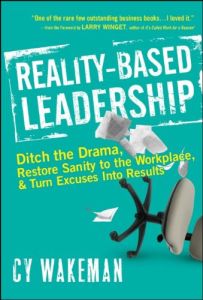Join getAbstract to access the summary!

Join getAbstract to access the summary!
Cy Wakeman
Reality-Based Leadership
Ditch the Drama, Restore Sanity to the Workplace, & Turn Excuses Into Results
Jossey-Bass, 2010
What's inside?
If the never-ending workplace soap opera drives you crazy, tune into reality instead.
Recommendation
Drama is emotionally expensive. Making up stories based on judgments about your circumstances is human nature, but those stories chew up time and energy and warp your decisions. Leadership consultant Cy Wakeman presents a simple but powerful process for clearing away blame, excuses and unenthusiastic performance. Much of Wakeman’s advice is common sense, in keeping with her “reality-based” outlook. She challenges commonly held beliefs about employee management, most notably the idea that the workplace is a democracy. getAbstract recommends her hard-nosed insights to leaders who are ready to conquer the drama.
Summary
About the Author
Speaker, workshop trainer and consultant Cy Wakeman blogs for FastCompany.
















Comment on this summary